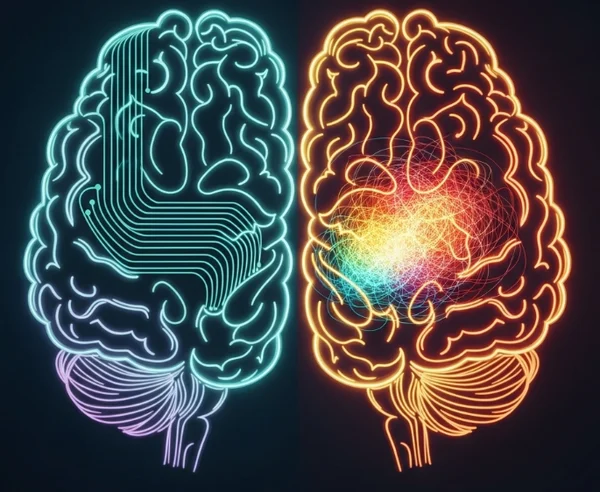Disfunzione Esecutiva: Dalla Pigrizia alla Neurodiversità
June 29, 2025 | By Morgan Hayes
Ti senti spesso disorganizzato/a, hai difficoltà ad iniziare i compiti o a gestire il tuo tempo, anche quando fai del tuo meglio? Molte persone attribuiscono queste difficoltà alla pigrizia o alla mancanza di volontà, causando un'immensa frustrazione e insicurezza. Ma se ci fosse una spiegazione diversa? Forse ti sei chiesto/a: Sono neurodivergente o semplicemente strano, pigro o ansioso? Questo articolo esplorerà la disfunzione esecutiva, una comune differenza neurologica spesso riscontrata negli individui neurodivergenti, specialmente in quelli con ADHD, chiarendo che si tratta di una sfida basata sul cervello, non di un difetto del carattere. Comprendere questa distinzione può essere il primo passo verso l'auto-accettazione e strategie efficaci. Per iniziare il tuo percorso di scoperta, considera di fare il nostro rapido e perspicace test sulla neurodiversità su inizia la tua auto-scoperta.
Cos'è la Disfunzione Esecutiva?
La disfunzione esecutiva si riferisce a difficoltà con quelle che sono note come funzioni esecutive, un insieme di abilità mentali. Queste abilità sono vitali per pianificare, focalizzare l'attenzione, ricordare le istruzioni e gestire con successo più compiti. Quando queste funzioni non operano in modo fluido come previsto, ciò può portare a difficoltà quotidiane erroneamente attribuite a fallimenti personali.
Definire le Funzioni Esecutive: Più che Semplice Organizzazione
Le funzioni esecutive sono il "centro di controllo" del nostro cervello. Includono una vasta gamma di abilità, tra cui:
- Memoria di Lavoro: Mantenere le informazioni attive nella mente e usarle per completare i compiti.
- Pensiero Flessibile: Adattarsi a nuove situazioni e cambiare prospettiva.
- Autocontrollo: Gestire gli impulsi e resistere alle distrazioni.
- Pianificazione e Prioritizzazione: Stabilire obiettivi e sequenziare i passaggi per raggiungerli.
- Inizio del Compito: Iniziare i compiti senza procrastinare.
- Organizzazione: Tenere traccia dei materiali e delle informazioni.
- Gestione del Tempo: Stimare e allocare il tempo in modo efficace.
- Regolazione Emotiva: Gestire i sentimenti e le risposte.
Queste funzioni esecutive, come puoi vedere, vanno ben oltre il semplice mantenimento dell'ordine o il ricordare di pagare le bollette in tempo. Sono fondamentali per navigare quasi ogni aspetto della vita.
Non è una Scelta: La Base Neurologica
Ti sei mai chiesto/a perché la forza di volontà non basta? Una delle comprensioni più cruciali sulla disfunzione esecutiva è che non si tratta di una scelta, di forza di volontà o di un difetto morale. Ha una base neurologica, il che significa che deriva da differenze nella struttura e nella funzione cerebrale, in particolare nella corteccia prefrontale. Per chi sperimenta la disfunzione esecutiva, il cervello elabora e organizza le informazioni in modo diverso. Questo rende certi compiti intrinsecamente più impegnativi rispetto a una persona con un cervello neurotipico. Questa differenza fondamentale significa che consigli tradizionali come "sforzati di più" o "organizzati meglio" possono essere inefficaci e persino dannosi, portando a profondi sentimenti di inadeguatezza e vergogna.

Riconoscere i Sintomi della Disfunzione Esecutiva
Identificare i sintomi della disfunzione esecutiva è fondamentale per comprendere le proprie esperienze e superare l'autocritica. Questi sintomi possono manifestarsi in vari modi, influenzando sia le routine quotidiane che le aree di vita significative.
Manifestazioni Comuni nella Vita Quotidiana
I segni della disfunzione esecutiva possono essere sottili o evidenti, apparendo spesso come difficoltà persistenti nei compiti quotidiani. Potresti trovarti a:
- Arrivare costantemente in ritardo, nonostante le migliori intenzioni.
- Avere difficoltà ad iniziare i compiti, anche quando sai che sono importanti (spesso definita "blocco da analisi").
- Avere difficoltà a suddividere grandi progetti in passaggi gestibili.
- Smarrire frequentemente oggetti o vivere in uno stato di disorganizzazione.
- Dimenticare appuntamenti, scadenze o dettagli importanti.
- Lottare con la prioritizzazione dei compiti, portando a sentirsi sopraffatti/e.
- Avere difficoltà a spostare l'attenzione da un'attività all'altra.
- Sperimentare scoppi emotivi o reazioni intense a piccoli contrattempi.
Questi sono solo alcuni esempi, ma illustrano quanto possa essere pervasiva la disfunzione esecutiva nella vita quotidiana.

Come la Disfunzione Esecutiva Impatta sul Lavoro e sulle Relazioni
Oltre alle difficoltà individuali, la disfunzione esecutiva può influenzare significativamente la vita professionale e le relazioni personali. Al lavoro o a scuola, le difficoltà nella pianificazione, nel rispetto delle scadenze e nel mantenimento della concentrazione possono portare a opportunità mancate o a prestazioni percepite come insufficienti. Nelle relazioni, le difficoltà nel ricordare gli impegni, nel gestire le emozioni o nell'iniziare attività congiunte possono talvolta essere interpretate erroneamente come disinteresse o mancanza di cura, portando a incomprensioni e frustrazione per tutte le parti coinvolte. Riconoscere questi impatti più ampi è cruciale per cercare un supporto efficace e promuovere la comunicazione. Se questi schemi ti risuonano, esplorare il tuo profilo neurologico unico può fornire chiarezza. Puoi scoprire di più su come questi tratti potrebbero inserirsi in un quadro neurodivergente più ampio.
ADHD e Funzioni Esecutive: Un Approfondimento
Mentre la disfunzione esecutiva può apparire in vari contesti, è particolarmente prominente e ben documentata negli individui con Disturbo da Deficit di Attenzione/Iperattività (ADHD). La connessione tra le sfide delle funzioni esecutive nell'ADHD è forte e centrale per comprendere la condizione.
Perché chi soffre di ADHD lotta spesso con le Funzioni Esecutive
Per molti individui con ADHD, le difficoltà principali derivano direttamente dalle sfide con le funzioni esecutive. Le differenze cerebrali associate all'ADHD influenzano spesso le vie neurali responsabili di queste abilità di "centro di comando". Ciò significa che la gestione dell'attenzione, la regolazione degli impulsi, la pianificazione e l'inizio dei compiti possono essere intrinsecamente più difficili per una persona con ADHD. Non si tratta di una mancanza di intelligenza o di desiderio, ma piuttosto di una differenza nel modo in cui vengono regolate le funzioni esecutive del cervello. Questa realtà neurobiologica spiega perché le strategie di motivazione tipiche spesso falliscono per chi soffre di ADHD.
Comprendere la Sensazione "Sono Pigro/a?"
La lotta costante con compiti che sembrano facili per gli altri, unita a una vita di feedback critici, porta spesso gli individui con ADHD a interiorizzare la convinzione di essere pigri o di non impegnarsi abbastanza. Questo dialogo interiore del tipo "sarò mica pigro/a con l'ADHD?" è incredibilmente comune e profondamente dannoso. Comprendere che questi sono sintomi di una differenza neurobiologica, piuttosto che di un difetto caratteriale, è una realizzazione profonda e liberatoria. Sposta la narrazione da un fallimento morale a una differenza neurologica, aprendo la strada all'autocompassione e a strategie di supporto efficaci. Questo cambiamento di prospettiva è una parte fondamentale dell'abbracciare il tuo cervello unico.

Navigare le Sfide Neurodivergenti
Comprendere le sfide neurodivergenti legate alla disfunzione esecutiva è il primo passo; il prossimo è trovare modi pratici per affrontarle. Si tratta di adattare il proprio ambiente e le proprie strategie al proprio cervello, piuttosto che forzare il proprio cervello ad adattarsi a uno stampo neurotipico.
Strategie Pratiche per Gestire la Disfunzione Esecutiva
Gestire la disfunzione esecutiva spesso significa creare strutture esterne per supportare i propri processi interni. Alcune strategie pratiche efficaci includono:
- Rendere esterne le informazioni: Utilizzare ampiamente calendari, agende, post-it e promemoria digitali. Se non è scritto, potrebbe quasi non esistere.
- Suddividere i Compiti: I grandi compiti possono sembrare insormontabili. Dividili in passaggi minuscoli e attuabili. Celebra ogni piccolo completamento.
- Body Doubling: Lavorare a fianco di qualcun altro, anche virtualmente, può fornire un'assicurazione esterna e un punto di focalizzazione.
- Time Blocking: Dedicare blocchi di tempo specifici a compiti specifici, e attenersi ad essi il più possibile.
- Ridurre le Distrazioni: Creare uno spazio di lavoro dedicato e libero da interruzioni.
- Gamification: Trasformare compiti noiosi in giochi per stimolare la motivazione intrinseca.
Sperimenta diversi approcci per scoprire cosa funziona meglio per il tuo cervello unico.

Costruire un Ambiente di Supporto
Creare un ambiente di supporto coinvolge sia lo spazio fisico che le relazioni. Comunica chiaramente le tue esigenze a familiari, amici e colleghi. Ad esempio, potresti chiedere le scadenze per iscritto, usare cuffie antirumore o spiegare che hai bisogno di istruzioni dirette e concise. Informare chi ti circonda sulla disfunzione esecutiva può favorire empatia e comprensione, riducendo gli attriti e costruendo connessioni più forti. Costruire una rete di supporto, sia attraverso gruppi di pari che professionisti, può anche fornire risorse e incoraggiamento inestimabili. Ricorda, non devi affrontare queste sfide da solo/a. Esplorare i tuoi tratti può aiutare gli altri a capirti meglio; visita esplora tratti unici.
Abbracciare il Tuo Cervello Unico
In definitiva, affrontare la disfunzione esecutiva significa più che semplicemente convivere; significa abbracciare il tuo cervello unico. Sebbene ci siano delle sfide, i cervelli neurodivergenti portano spesso con sé incredibili punti di forza. Molti individui neurodivergenti mostrano eccezionale creatività, iperfocus su aree di interesse, capacità innovative di risoluzione dei problemi e una prospettiva unica sul mondo. Comprendendo il tuo profilo specifico, puoi imparare a sfruttare questi punti di forza e a sostenere ambienti in cui puoi prosperare, piuttosto che cercare costantemente di adattarti a uno stampo che non è stato creato per te.
Potenziare il Tuo Percorso Neurodivergente
Comprendere la disfunzione esecutiva come una differenza neurologica, piuttosto che un difetto del carattere, è una rivelazione veramente potenziante. Valida le difficoltà che potresti aver sperimentato e apre le porte all'autocompassione e a strategie efficaci. Questa conoscenza non riguarda la diagnosi, ma l'autoconsapevolezza e l'auto-accettazione.
Se la lettura di questo articolo ti ha risuonato e sei curioso/a di esplorare ulteriormente il tuo profilo neurologico unico, la nostra valutazione online gratuita può servire come test di neurodiversità. Questo strumento di 10 domande è progettato per fornirti approfondimenti personalizzati, aiutandoti a capire se le tue esperienze potrebbero allinearsi con tratti neurodivergenti comuni. È un punto di partenza di supporto, non diagnostico, per la comprensione di sé. Inizia il tuo viaggio personale verso la chiarezza e l'auto-accettazione. Fai il test ora e potenzia te stesso/a per comprendere il tuo cervello unico.
Le Tue Domande sulla Disfunzione Esecutiva e la Neurodiversità Rispondono
Quali sono i segni di essere neurodivergente?
I segni di essere neurodivergente sono diversi, poiché la neurodiversità comprende molti profili neurologici differenti. Indicatori comuni possono includere differenze nella comunicazione sociale, nell'elaborazione sensoriale, nella regolazione dell'attenzione, nell'intensità emotiva, nell'elaborazione delle informazioni e nell'adesione alle routine. Questi segni sono spesso evidenti nel modo in cui gli individui imparano, interagiscono e percepiscono il mondo che li circonda, differendo significativamente dalle esperienze neurotipiche.
Sono neurodivergente o solo strano/pigro/ansioso?
È comune sentirsi "strani", "pigri" o "ansiosi" quando il proprio cervello funziona diversamente dal previsto. Tuttavia, questi sentimenti derivano spesso da un'incompatibilità fondamentale tra il proprio profilo neurologico e le richieste di un mondo neurotipico. I sintomi della disfunzione esecutiva, ad esempio, non sono indicatori di pigrizia, ma piuttosto rappresentano differenze neurologiche genuine nel modo in cui il cervello gestisce i compiti e l'autoregolazione. Comprendere questa distinzione può essere incredibilmente validante. Per ottenere approfondimenti personalizzati sui tuoi tratti unici, puoi ottenere approfondimenti con il nostro test online gratuito.
Si può essere neurodivergenti e non avere ADHD o autismo?
Assolutamente. Mentre l'ADHD e l'autismo sono due delle forme di neurodivergenza più comunemente riconosciute, il termine "neurodivergente" è un ampio ombrello. Include condizioni come la dislessia, la disprassia, la sindrome di Tourette, la discalculia e molte altre variazioni neurologiche. Il concetto di neurodiversità celebra tutte le differenze cerebrali umane come variazioni naturali, non come deficit.
Quali sono i punti di forza di un cervello neurodivergente?
Molti individui neurodivergenti possiedono incredibili punti di forza. Ad esempio, chi soffre di ADHD spesso dimostra notevole creatività, pensiero innovativo e alta energia. Gli individui autistici possono avere un'eccezionale attenzione per i dettagli, un forte ragionamento logico e una profonda conoscenza nelle aree di interesse speciale. Gli individui dislessici eccellono frequentemente nel ragionamento spaziale, nella risoluzione dei problemi e nel pensiero globale. Esplorare il tuo quiz sui tratti neurodivergenti può aiutarti a identificare questi vantaggi unici e come sfruttarli.